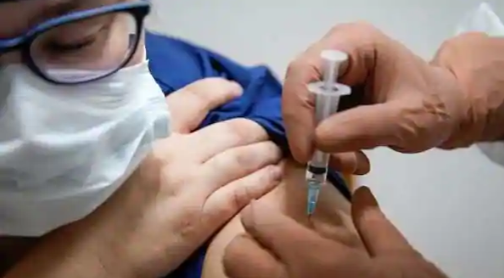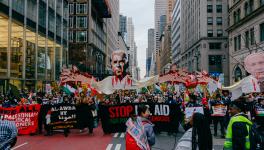COVID-19: People’s Science Network Raises Questions about Vaccine Politics

Image Courtesy: Reuters
India is very likely to get a COVID-19 vaccine soon, hinted V.G. Somani, the Drug Controller General of India (DGCI) at a webinar on Thursday, December 31.
“We will have a Happy New Year with something in hand, that’s all I can hint at,” he said. The subject expert committee (SEC) under the Central Drugs Standard Control Organisation (CDSCO) will meet on January 1 to consider the emergency-use authorisation applications of three companies—Pfizer, Serum Institute of India – which will manufacture the Oxford AstraZeneca vaccine – and Bharat Biotech’s Covaxin. This will be the second meeting of the SEC with the companies to examine the research data so far.
The All-India People’s Science Network (AIPSN) has called for a science-based, equitable and rigorously conceived nationwide policy in India for the development, manufacture and deployment of vaccines in a free, universal vaccination strategy against COVID-19. In a statement released earlier this month, AIPSN said: “Accelerated development and deployment of a safe and effective vaccine is crucial to combat the rampaging COVID-19 pandemic to protect individuals and enable full and safe re-opening of the economy and society.”
AIPSN has pointed out that access to free vaccination is essential for people’s right to life and health, given that the disease has resulted in a significant burden of preventable morbidity or serious illnesses, mortality and deaths. Though the proportion of infected persons who are faced with serious symptoms is low, the number of persons who are at risk is unacceptably high in absolute numbers.
“Free vaccination is also necessary since it is low-income working people who have paid the maximum social costs of the lock-down and disruption of the economy, and because vaccine development has mostly been done with public funds. At the same time, a nationwide vaccination programme is a challenge and raises crucial questions including with regard to the preparedness of the public health system in India to deliver this without compromising other essential health services,” the AIPSN statement mentioned.
In a statement released on December 12, AIPSN had said that though the urgency for approval and deployment of vaccines is no doubt of importance, it should be done at the cost of safety or potential impact in reducing infection, transmission and severe illness or mortality. It pointed out that with the national caseload on a declining trend, there is an opportunity to hasten slowly as the WHO recommends.
The organisation has also raised concerns about the cost of the vaccine. US-German Pfizer-BioNTech and the US-based Moderna have both declared efficacy of above 90% for their two-dose vaccines and applied for Emergency Use Authorization (EUA) in the US and the Conditional Marketing Agreement (CMA) in the European Union. Both these vaccines are relatively expensive (Pfizer at around USD 40 and USD 70 for two doses of Moderna’s vaccine) and, importantly, require very low temperature cold chains, adding to the cost and delivery challenges for India and other developing countries.
The UK-based Oxford University-Astra Zeneca, which is partnering with the world’s largest vaccine manufacturer – Pune-based Serum Institute of India (SII) – for mass production of its vaccine, has claimed an average 70% efficacy across different modes and 90% efficacy at specific dosage. This double-dose vaccine is expected to be relatively inexpensive at around six USD and, significantly, can be stored at ordinary refrigerator temperatures, making delivery easier in India and to other developing countries.
Russia’s RDIF-Gamaleya Institute has also declared an effectiveness of over 90% for its “experimental” Sputnik-V vaccine. The powdered version requires storage at refrigerator-like temperatures while its liquid version has to be stored at -18 degrees C. The vaccine is expected to cost about USD 20 for two doses. This vaccine is undergoing Phase-3 trials in different countries, including India, and will be manufactured by Hetero Biopharma in Hyderabad.
China’s Sinovac is being deployed widely in China and also in Brazil. It is gearing up for global supply when regulatory approvals are obtained with an international price tag of around USD 60 for two doses. It also requires standard refrigerator-like temperatures. Again at the time of writing, another vaccine from Sinopharm in China has been declared by the UAE as having 86% efficacy in the Phase-3 trials in the country. It had been given an EUA in September for front-line workers, but data from the trials is still not public.
These developments represent a significant achievement for science and medical research since they have shown such promising results over a short period of time. AIPSN, however, also pointed out that questions have already been raised about how scientific, rigorous, or transparent these EUAs have been.
The Prime Minister, in his televised address to the nation on October 20, assured that the government seeks to ensure delivery of the vaccine to every citizen. “However,” the AIPSN statement pointed out, “the Health Secretary in the presence of DG ICMR stated categorically that the government has never committed to universal vaccination which was in fact not necessary since the need is only to break the chain of transmission and obtain ‘herd immunity,’ and therefore the government may not vaccinate the entire population. It would, however, be extremely difficult to decide which sections to leave out of the vaccination programme and explain such a decision, since this would raise serious apprehensions of discrimination or injustice on different grounds.”
Get the latest reports & analysis with people's perspective on Protests, movements & deep analytical videos, discussions of the current affairs in your Telegram app. Subscribe to NewsClick's Telegram channel & get Real-Time updates on stories, as they get published on our website.
























